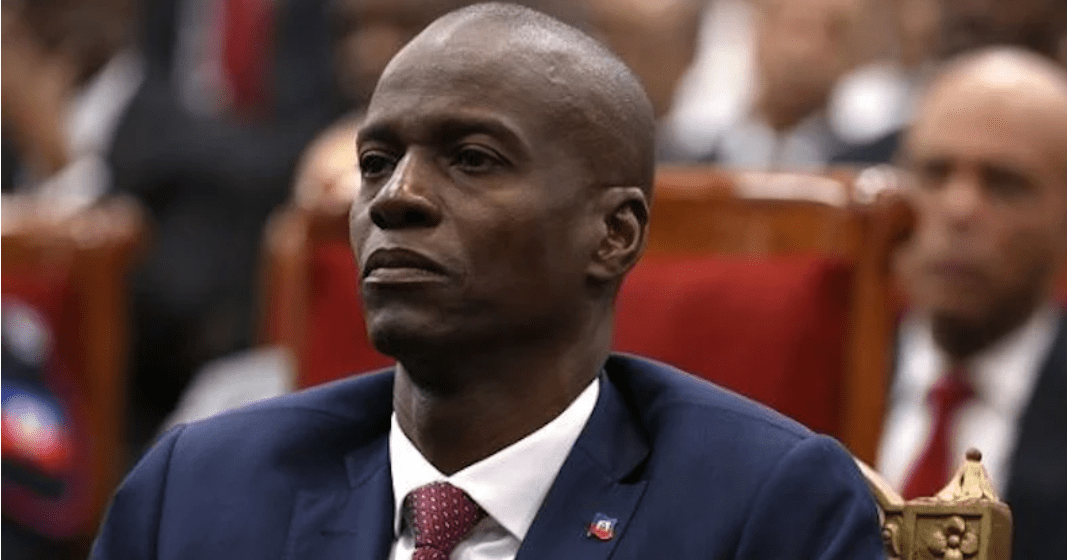|
LISTEN TO THIS THE AFRICANA VOICE ARTICLE NOW
Getting your Trinity Audio player ready...
|
Haitian President Jovenel Moïse was assassinated at his private home in Port-Au-Prince, the Caribbean nation’s capital.
According to the Associated Press (AP), a squad of gunmen raided Moïse home on July 7 at 1 am and sprayed him with bullets killing him and wounding his wife.
First lady Martine Moïse was flown out of Haiti to a Miami hospital Wednesday. Newsweek reports she in critical but stable condition after suffering multiple gun wounds in the attack.
Interim Prime Minister Claude Joseph confirmed the killing and told A.P. the police and military were in control of the nation’s security. Joseph alluded Moïse was killed by some oligarchs he had opposed. In a speech to the country, Joseph declared a state of emergency, urged calm, and promised justice.
U.S. President Joe Biden posted a statement on the White House website expressing shock at the assassination.
“We are shocked and saddened to hear of the horrific assassination of President Jovenel Moïse and the attack on First Lady Martine Moïse of Haiti,” Biden said. “We condemn this heinous act, and I am sending my sincere wishes for First Lady Moïse’s recovery.”
He pledged support.
“The United States offers condolences to the people of Haiti,” Biden said. “And we stand ready to assist as we continue to work for a safe and secure Haiti.”
Reports indicate the brazen, heavily armed assailants spoke English and Spanish, but Haitians speak French and Haitian Creole. The attackers pretended to be U.S. Drug Enforcement Agency (DEA), suggesting they were mercenaries.
In a video of the attack obtained by the Miami Herald, a man, who sounds like an American, can be heard yelling in a loudspeaker, “DEA operation. Everybody stand down.”
In a statement posted on their Twitter account, the Embassy of Haiti in the U.S. described the attack as “a well-coordinated attack by a highly trained and heavily armed group.”
They promised to do everything possible to bring those responsible for the heinous act to swift justice.
According to multiple news agencies, fears of chaos and political upheaval persist. Miami Herald reports Haitian police have killed four attackers and arrested two others. According to Washington Post, a U.S. citizen of Haitian descent was arrested in connection to the assassination.
James Solages, a U.S. citizen, is among the six people arrested in Moïse’s killing. Mathias Pierre, Haiti’s minister of elections and inter-party relations, said. Pierre told The Washington Post that at least one other detainee is also believed to be a Haitian American.

The assassination has thrown the country back into an atmosphere of uncertainty.
Still reeling from the effects of the 2010 magnitude 7.0 earthquake that killed roughly 250,000, wounding another 300,000 and displacing more than 5 million people, Haiti has not had an easy path.
Before his assassination, Moïse was presiding over a tense country dissatisfied with his leadership. Opponents were calling for his resignation over corruption allegations, economic mismanagement, and concerns over his tightening grip on power.
Moïse, 53, a former businessman, became president in 2017 after a drawn-out process that lasted 14 months. According to National Public Radio (NPR), the first contest occurred on Oct. 25, 2015, but no winner was declared because opposition and human rights groups claimed fraud and vote-rigging.
Haiti rescheduled the second round of the presidential elections for December 2015, but it was postponed to January 2016, but it never happened. The head of Haiti’s electoral council told NPR security concerns necessitated the delay.
The delay led Haiti into a constitutional crisis on Feb. 7, 2016, when then-president Michel Martelly was termed out and forced to leave office without a successor.
His departure from office led to an agreement paving the way for Haiti’s senate President Jocelerme Privert to serve as interim president for 120 days, according to an Oct. 5, 2016, NPR report.
But even after the 120 days elapsed, Haiti was not ready to hold the election. The election, then scheduled for fall 2016, was again postponed after Hurricane Matthew slammed into Haiti, adding to the nation’s misfortunes and stretching Privert’s interim tenure to almost a year.
On Nov. 20, 2016, Haiti held new elections; this time, Moïse won outright, garnering more than 55 percent of the vote. He took over the presidency on Feb. 7, 2017.
Click here to read Haiti’s country profile by BBC











LEAVE A COMMENT
You must be logged in to post a comment.